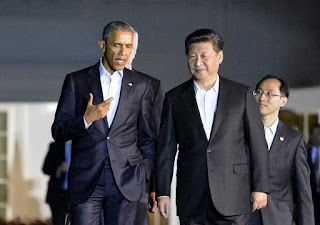Is China serious to mend ties with America?
China's President Xi
Jinping's recent scheduled visit to the United States on Sept. 22-24 last year
 |
| U.S. President Obama and President Xi. Photo: USChinaStrong.org |
But to other political
experts, Xi's visit to the White House
was properly choreographed to let the world know that China is a friendly
nation that is always ready to shake hands with other leaders even in the midst
of a controversy that involves national security.
As reported by
Bloomberg Businessweek (Sept. 21-27 issue), the Chinese leader's visit had two
goals: "to reassure executives that China is still a good place to do
business, and to secure for China the respect due a state of equal in stature
to the United States."
Maybe true, maybe not.
That is probably what other pundits are talking about, knowing how China's
aggressive stance on the issue of human rights violations, cybersecurity and
the tensions that its military has created in the South China Sea.
Aware of these issues,
the U.S. government has, in fact, urged China to "speed up its financial
reforms so as to avoid another repeat of the summer's stock market crash or the
poorly managed devaluation of the yuan--events that shook the world markets."
Orville Schell,
director of the U.S.-China Relations in New York, told Bloomberg: "The
relationship is not great and has been getting worse." While Zhu Feng, professor of international
relations at Nanjing University, readily agreed. He added in the Bloomberg
report: "A lot of things have piled up, and the stakes have never been
higher to deal with these accumulated concerns."
Despite the diplomatic
respects that the U.S. government has shown during Chinese leader's visit, the
"administration appears far from treating China as an equal."
Some political
observers believed that the U.S. is still superior than China. And I wouldn't
be surprised at all why China has acted the way it should? Of course, it is
public knowledge that China holds trillions of U.S. commercial debts. However,
it doesn't mean that the U.S. will kneel down to the pressures that China would
want to impose without first mending its slightly severed ties with the United
States.
One the serious issues
that China should address impinges on the "cyber espionage emanating from
China after it breached the U.S. Office of Personnel Management where it
exposed the records of some 20 million current, former and prospective federal
employees." Suspects in the said breach were believed to be Chinese
hackers who stole commercial information. In fact, President Obama said on
Sept. 11 at Fort Meade in Maryland that "cyber attacks are not
acceptable." Although Obama didn’t specifically mentioned that it was done
by the Chinese hackers upon the dictate of Chinese officials.
If this concern rings
true, how on earth could China do such a breach while at the same time, coming
to the U.S. to woe more prospective businesses to relocate in China? The
situation has a semblance to a story of a "wolf coming in a sheep's
clothing."
To some observers,
China's actions may be misconstrued as a wagging of its tail for having
accumulated so much debt papers that the U.S. may not be able to redeem in the
future. Perhaps, this is a secret weapon that China is trying to display, if
only to show the world that it has an economic edge over the U.S. now?
For a moment, the
world has yet to wait on the sideline whether the soured relationship between
the two countries could be mended in due course. But with the outcome of President
Obama’s recent official visit to China, where international political observers
were surprised to learn of China’s failure to give the U.S. leader a “red
carpet” welcome at the airport? Sources said it was a move by Washington to not roll out the red carpet on account that the Chinese driver of the ramp at the tarmac couldn't speak and understand English.
Was this China’s
deliberate attempt to let the world know that it isn’t happy about the United
States’ interference in the South China Sea disputes with some claimants,
especially the Philippines which won a favorable ruling in July 2016 from the
Permanent Court of Arbitration concerning its valid claims over some of the
islands and reefs in the South China Sea based on the provisions enshrined in
the charter of the United Nations on the Law of the Sea, which China is a
signatory. Yet, it continues to violate what it signed for by merely invoking
the historical significance of its ancient claims on almost all parts of the South
China Sea.
Ignoring the ruling of
the arbitral tribunal, China continues its elaborate display of military might
by reclaiming some of the islands and reefs inside Philippine territorial
waters. Latest of which is China’s attempt to build infrastructures at the
Scarborough Shoal, which is only about 120 nautical miles from Zambales
province in Luzon.


Comments